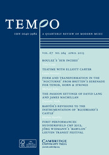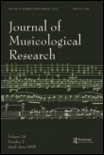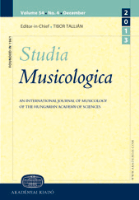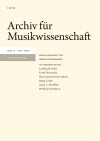
TEMPO
Scope & Guideline
Harmonizing History and Modernity in Music Studies
Introduction
Aims and Scopes
- Contemporary Music Analysis:
TEMPO publishes in-depth analyses of contemporary musical compositions, exploring their structural, thematic, and contextual elements. - Interdisciplinary Approaches:
The journal emphasizes interdisciplinary research, integrating musicology, cultural studies, and technology to provide a comprehensive understanding of music's role in society. - Creative Processes and Practices:
Articles often delve into the creative processes of composers and musicians, highlighting their methodologies, influences, and the evolution of their work. - Cultural and Historical Contexts:
TEMPO seeks to situate contemporary music within historical and cultural frameworks, examining how past movements and events influence current practices. - Experimental and Avant-Garde Music:
The journal encourages submissions that challenge traditional notions of music, focusing on experimental and avant-garde compositions that redefine boundaries.
Trending and Emerging
- Digital and Technological Integration:
A significant increase in discussions about digital scores, technology in composition, and the impact of digital media on music creation and performance is evident, reflecting the current technological landscape. - Ecological and Sustainability Concerns:
There is a growing focus on sustainability in music, with articles addressing ecological dimensions and the role of music in environmental discourse, indicating a broader societal concern. - Cross-Disciplinary Collaborations:
Emerging themes highlight the importance of cross-disciplinary work, showcasing how music interacts with other fields such as visual arts, literature, and technology. - Exploration of Identity and Marginal Voices:
Recent publications increasingly focus on identity, diversity, and the representation of marginalized voices within contemporary music, reflecting a broader commitment to inclusivity. - Improvisation and Notational Practices:
There is a rising interest in improvisation and the exploration of notational practices, particularly how they inform contemporary performance and composition.
Declining or Waning
- Traditional Music Forms:
There has been a noticeable decrease in articles centered around traditional music forms, as the journal increasingly prioritizes contemporary and experimental practices. - Historical Compositional Techniques:
Discussions focusing strictly on historical compositional techniques, such as classical harmony and counterpoint, are becoming less prevalent, indicating a shift towards more innovative and modern approaches. - Biographical Studies of Established Composers:
While profiles and biographical studies were once common, there is a waning interest in solely biographical narratives about established composers, favoring more contextually rich analyses instead. - Music Education Pedagogy:
Themes surrounding music education and pedagogy appear to be declining, as the journal pivots towards discussions on creative practices and innovative methodologies in contemporary music.
Similar Journals

Muzikoloski Zbornik
Championing Open Access in Music ScholarshipMuzikoloski Zbornik is a prominent open-access journal in the field of musicology, published by the esteemed University of Ljubljana Press since 1965. Hailing from Slovenia, this journal has been dedicated to advancing the study of musical heritage, theory, and practice, serving as a vital platform for researchers, professionals, and students alike. With a notable Q2 category ranking in the field of music and a Scopus ranking of 109 out of 180 in Arts and Humanities, Muzikoloski Zbornik showcases high-quality research, fostering discourse and collaboration among scholars globally. The journal embraces a diverse range of topics, from ethnomusicology to music education, ensuring its relevance in an ever-evolving academic landscape. By providing unrestricted access to its content, it champions the dissemination of knowledge and supports the growth of the musicology discipline.

ACTA MUSICOLOGICA
Pioneering Conversations in the World of MusicologyACTA MUSICOLOGICA, published by the International Musicological Society, stands as a pivotal journal within the field of Musicology, garnering attention from scholars and practitioners alike. With its ISSN 0001-6241, the journal serves as a vital platform for innovative research and discourse from 2002 to 2013 and again from 2016 to 2024, achieving a Q2 ranking in the 2023 Music category. Reflecting a commitment to excellence, it ranks #105 out of 180 in Arts and Humanities Music according to Scopus, placing it at the 41st percentile among its peers. Although not open access, ACTA MUSICOLOGICA ensures the dissemination of significant musical research, fostering scholarly exchange and exploration. This esteemed publication is essential for researchers, professionals, and students looking to deepen their understanding of musicology and contribute to ongoing academic conversations.

JOURNAL OF MUSICOLOGICAL RESEARCH
Fostering Scholarly Dialogue in Music StudiesJOURNAL OF MUSICOLOGICAL RESEARCH, published by Taylor & Francis Ltd, is an esteemed platform that delves into the field of musicology, contributing to the ongoing dialogue in music research and scholarship since its establishment in 1979. With an ISSN of 0141-1896 and an E-ISSN of 1547-7304, this journal serves as a vital resource for researchers, professionals, and students, offering insights into diverse musicological topics. Although currently categorized in Q4 in Music with Scopus rankings placing it at #110 out of 180 in the Arts and Humanities field, its commitment to excellence and broader discourses in music studies is evident. The journal does not have Open Access options, yet it provides accessible content through reputable academic channels, fostering scholarly exchanges within the community. It aims to publish high-quality research that advances understanding of musical practices and cultural implications, making it a critical resource for those passionate about music and its myriad influences.

Music Theory Online
Transforming Understanding: The Leading Voice in Music TheoryMusic Theory Online is a distinguished journal within the field of music, published by the Société for Music Theory. With an ISSN of 1067-3040, this open access journal has been providing valuable insights and scholarly contributions since 1993. Based in the United States, at the University of Chicago, Department of Music, it serves as a platform for rigorous research and discourse in music theory. The journal has achieved significant recognition, attaining a Q1 ranking within its category for 2023 and positioning itself at the 26th percentile among 180 journals in the Arts and Humanities, demonstrating its impact on the field. Facilitating access to cutting-edge studies, Music Theory Online aims to engage researchers, educators, and students by fostering a deeper understanding of music theory concepts and methodologies, thereby contributing to the advancement of musical scholarship.

Musica Hodie
Unveiling the Rich Tapestry of Music ResearchMusica Hodie is a pivotal academic journal published by the Universidade Federal de Goiás, Brazil, focusing on the field of music. The journal, with ISSN 1676-3939 and E-ISSN 2317-6776, serves as a vital platform for scholars, professionals, and students to disseminate innovative research findings and critical analyses related to music theory, history, and practice. With a prestigious Q2 ranking in the Music category and a Scopus rank of 103/180, the journal significantly contributes to the cultural and academic landscape of music studies in Brazil and beyond, covering converged years from 2010 to 2016 and also from 2018 to 2023. Although it operates under a subscription model, the journal remains committed to fostering open dialogue and knowledge sharing in the arts and humanities. As researchers delve into the intricacies of music, Musica Hodie stands out as a key resource for advancing scholarly discourse and enhancing the understanding of music’s multifaceted role in society.

Studia Musicologica
Illuminating Music's Multifaceted Role in SocietyStudia Musicologica, published by AKADEMIAI KIADO ZRT, stands as a leading journal in the field of musicology, dedicated to the exploration and analysis of music across diverse cultures and historical contexts. With its ISSN 1788-6244 and E-ISSN 1789-2422, this journal provides an essential platform for disseminating high-quality research and critical analyses, thereby contributing significantly to scholarly discourse in music studies. Although it operates on a traditional access model, its rigor and foundational contributions ensure that it remains invaluable for researchers, professionals, and students alike. Situated in the heart of Hungary, Studia Musicologica engages with a broad spectrum of topics including music theory, ethnomusicology, and music history, fostering a deeper understanding of music's multifaceted role in society. This makes it an essential resource for anyone interested in advancing their research or professional practice within the expansive field of musicology.

REVUE DE MUSICOLOGIE
Exploring the Harmonies of MusicologyREVUE DE MUSICOLOGIE is a prominent academic journal dedicated to the diverse field of musicology, published by EDITIONS TRANSATLANTIQUES in France. With an ISSN of 0035-1601, this journal has been a key platform for researchers and scholars since its inception, fostering scholarly discourse and advancing the understanding of music's cultural, theoretical, and historical dimensions. Although it currently holds a Q4 category in Music according to the 2023 quartiles and is ranked #140 in the Scopus Arts and Humanities Music category, REVUE DE MUSICOLOGIE continues to publish valuable insights that contribute to the global musicological landscape. The journal does not offer open access, adhering to standard subscription models. Its primary objective is to provide a rigorous forum for original research articles, reviews, and theoretical discussions, making it an essential resource for academics, professionals, and students in the field of musicology. Located at 50 RUE JOSEPH DE MAISTRE, 75018 PARIS, FRANCE, it promises to remain a vital part of music research through 2023 and beyond.

Musicologist
Connecting Theory, History, and Practice in MusicologyMusicologist is a premier academic journal dedicated to the exploration and analysis of music theory, history, and practice, published by the esteemed Trabzon University State Conservatory in Turkey. With an ISSN of 2618-5652, this journal has been a vital platform for scholars since its inception in 2019, reflecting a commitment to fostering innovative research in the field of music. Recognized for its quality, the journal currently holds a Q2 ranking in the music category for 2023, placing it within the top segments of its discipline, as evidenced by its position at #72 out of 180 in the Scopus rankings, representing the 60th percentile. Although the journal employs a traditional publication model, it serves as a crucial repository for contemporary musicological discourse, aiming to advance knowledge and understanding within a vibrant academic community. Musicologist is not only a resource for seasoned researchers but also an invaluable tool for students and professionals alike, nurturing a comprehensive appreciation of music as an art form and scholarly pursuit.

RIVISTA ITALIANA DI MUSICOLOGIA
Diving Deep into the World of MusicologyRIVISTA ITALIANA DI MUSICOLOGIA, published by the Italian Society of Musicology, is a distinguished journal dedicated to the field of musicology, offering a platform for scholarly research and discourse on a wide array of musical topics. With an ISSN of 0035-6867 and an E-ISSN of 2036-5586, this journal has contributed significantly to the understanding of music in cultural and historical contexts. Although the scope of coverage was marked from 2003 to 2008 in renowned databases like Scopus, the journal continues to serve as an invaluable resource for researchers, educators, and students embroiled in music studies. Its emphasis on rigorous research and critical analysis makes it a vital asset for anyone seeking to deepen their knowledge of musicological inquiry. While not an open-access publication, the RIVISTA ITALIANA DI MUSICOLOGIA remains a prestigious outlet for scholarly contributions that reach audiences eager to explore the complexities of musical heritage.

ARCHIV FUR MUSIKWISSENSCHAFT
Advancing Knowledge in Music Theory and HistoryARCHIV FUR MUSIKWISSENSCHAFT, the esteemed journal published by FRANZ STEINER VERLAG GMBH, serves as a significant platform for the dissemination of scholarly research in the field of musicology. With an ISSN of 0003-9292 and an established history of publication reaching back to 2002, this journal aims to explore various aspects of music theory, history, and ethnomusicology, contributing to academic discourse within a vibrant global community. Despite its designation in the Q4 category for music in 2023, the journal continues to foster innovative research and discussions among budding musicians, established academics, and music enthusiasts alike. While Open Access options are not currently available, the journal's offerings are enriched by a thorough review process aimed at maintaining high academic standards. Located in Stuttgart, Germany, at BIRKENWALDSTRASSE 44, D-70191, ARCHIV FUR MUSIKWISSENSCHAFT is committed to engaging its readers through insightful articles and reveals the evolving landscape of music scholarship while remaining a resourceful tool for researchers and students pursuing knowledge in this captivating field.